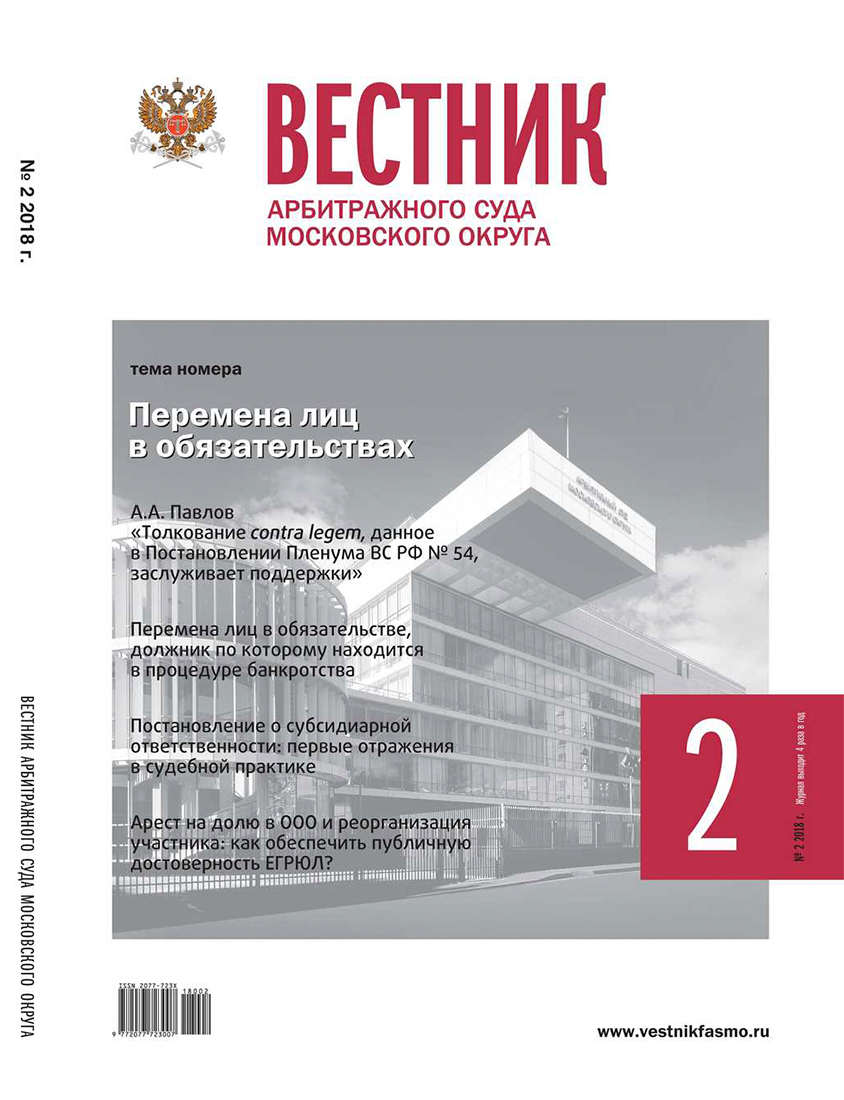Courts News
News of Moscow District Courts
Interview of the issue
A.A. Pavlov
The contra legem interpretation given in the SC Plenary Resolution No. 54 attracts support
Topicality
Arrest for a Share in an LLC and Reorganisation of a Participant: How to Ensure Public Reliability of the Unified State Register of Legal Entities?
Analytics: Substitution of Parties in an Obligation
S.A. Morozov
Restrictions on the Substitution of Parties in an Obligation the Debtor of Which Is iIn Bankruptcy Proceedings
As a general rule, the law provides for a very narrow list of circumstances that may hinder a substitution of parties in the obligation. However, the case of debtor’s bankruptcy is complicated by the necessity to take into account both the interests of the parties of the obligation and the interests of third parties — bankruptcy creditors of the insolvent person. In this connection, bankruptcy law and its application practice have resulted in a number of additional restrictions on the substitution of parties aimed at protecting these interests. The author analyses relevant bankruptcy legislation and its application practice and describes the most common cases when the court recognises the assignment of the right / debt transfer failed / invalid due to the presence of the debtor in the bankruptcy proceedings.
Keywords: bankruptcy, substitution of parties in the obligation, performance of obligations for a third party
P.M. Morkhat
Invalidation of the Agreement for the Assignment of Claim Rights (Cession) In Insolvency (Bankruptcy) Proceedings: Legal Theory and Court Practice
The article considers the peculiarities of invalidation of the assignment agreement within the framework of insolvency (bankruptcy) procedure, gives examples of definitions of the concept of “assignment of claim law”, and addresses the peculiarities of this agreement. Grounds for contestation of debtor’s transactions are classified. The current Civil Code of the Russian Federation uses the term “assignment of claim” only in respect of transactions aimed at the transfer of the right in personam. The transfer of a right by virtue of the law is not considered as an assignment, although it leads to similar results, i.e. to a substitution of a party in the obligation. The peculiar approach formed by the judicial practice is considered in order to understand which of the grounds provided by Chapter III.1 of the Law on Bankruptcy become the basis of judicial acts by which the debtor’s assignment agreements are recognised as invalid, as well as what evidence is accepted by the court as a confirmation of the existence or absence of grounds for invalidity.
Keywords: assignment of claim rights, agreement, insolvency, bankruptcy, definition, court practice
Analytics: Open Forum
E.V. Gurchenko, A.E. Lidzhanova
Plenary Resolution of the Supreme Court of the Russian Federation on Subsidiary Liability: First Reflections in Court Practice
The article analyses certain explanations of the SC Plenary Resolution on bringing the debtor’s controlling persons to responsibility in bankruptcy, as well as how they have been perceived by courts at the moment.
Keywords: insolvency (bankruptcy), subsidiary liability, controlling person of the debtor
V.V. Degtyarev
International Cooperation to Combat Corruption within the Council of Europe
The author assesses the importance of the recommendations of the Group of States against Corruption in setting anti-corruption standards for states and highlights the tools to monitor compliance with these recommendations.
Keywords: anti-corruption, anti-corruption standards, national anti-corruption policy, GRECO recommendations, GRECO monitoring
Yu.A. Alekseeva
Compliance with the Anti-Corruption Legislation of the Russian Federation in the Employment of Citizens Who Had Previously Held Civil Service Posts
The article highlights the problems of compliance with the Russian anti-corruption legislation by former civil servants in terms of restrictions on entry into labor and civil relations with the receipt of remuneration. The author concludes that the existing regulations make it difficult to prosecute employers or contractors who have not reported the conclusion of a contract with a former civil servant, and acknowledges the lack of proper mechanisms of responsibility and control over the actions of former civil servants which leads to the low effectiveness of these anti-corruption regulations.
Keywords: civil service, anti-corruption legislation, conflict of interest, employment of former civil servants
Scientific Advisory Council
Minutes of the Meeting of the Scientific Advisory Council of the Arbitrazh Court of the Moscow District No. 15
Protocol decision of the Presidium of the Arbitrazh Court of the Moscow District No. 33
Court Practice Reviews
Minutes No. 162 of the Working Group Meeting Discussion of the Practice of Application of the Arbitrazh Procedure Code of the Russian Federation


